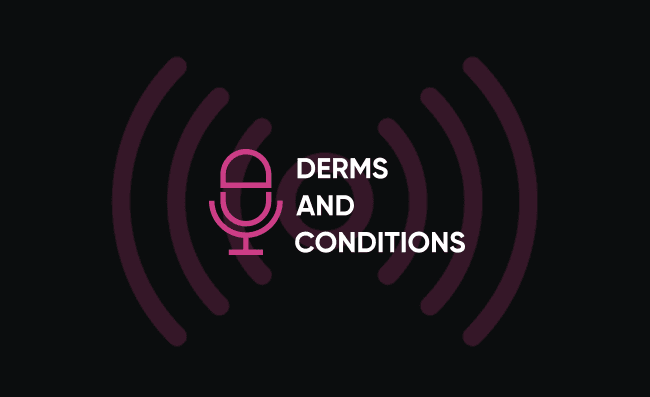Derms and Conditions Podcast Episode 61:
Once Is Not Enough: Round 2 on Therapeutic Insights
Release Date: October 05, 2023
In episode 61 of Derms and Conditions, our host, James Q. Del Rosso, DO, presents a self-made episode where he clarifies key points on many therapies relevant to everyday clinical practice. First, he discusses topical alpha-agonist therapy for persistent facial erythema (PFE) of rosacea. Long-term data shows that daily use of either topical oxymetazoline or brimonidine appears to “reset” (lower) the baseline level of PFE in patients with rosacea.
Next, he talks about subantibiotic dosing of doxycycline and how its anti-inflammatory properties, including support of the dermal matrix, can be used for the treatment of rosacea. He notes that studies have demonstrated reduced antibiotic selection pressure with decreased emergence of antibiotic-resistant bacterial strains with this therapeutic approach. Additionally, monotherapy with subantibiotic dose doxycycline used as maintenance treatment has been shown to be effective in reducing relapse of papulopustular rosacea (PPR), an approach that is appealing to those patients who do not prefer or are not compliant with topical therapy. Dr Del Rosso then mentions sarecycline, a narrow-spectrum tetracycline FDA approved for the treatment of acne in patients >9 years of age, which has also been shown in a large pilot study to be effective for PPR. Microbiological data demonstrates that the narrow antibiotic spectrum of sarecycline spares activity against many strains of bacteria, especially gram-negative organisms that inhabit the GI tract.
He then transitions to hidradenitis suppurativa (HS) and the welcome emergence of IL-17 inhibitors for HS, which are very effective based on study results to date. Dr Del Rosso stresses the importance of early consideration of biologic therapies (such as anti-IL agents) for HS, as this disease progresses below the skin surface with eventual development of sinus tracts and scarring. If we wait until we “see” these consequences, it is too late as they have already occurred. FDA approvals and published guidelines typically depend on visibly seeing the clinical manifestation before a specific therapy is recommended, which is not early enough in many cases.
He finishes with a discussion on dupilumab for the treatment of atopic dermatitis, which is often remarkably effective but at times may be limited by partial efficacy or side effects such as conjunctivitis and facial erythema. Dr Del Rosso discusses practical use of JAK inhibitors such as abrocitinib and upadacitinib for AD in dupilumab “nonresponders” and also case reports with tralokinumab, a monoclonal antibody targeting IL-13. Tune in to this episode to learn more!
